- Home
- Joseph Bruchac
Talking Leaves Page 3
Talking Leaves Read online
Page 3
Even before my father became a blacksmith, he knew a great deal about working with metals. When he was a young man he began melting down silver coins to make the sort of jewelry that is still much in demand among our people. I cannot count how many times I have seen Tsalagi men and women wearing silver nose rings or earrings or armlets or bracelets that bear the stamp GEORGE GUESS on them.
Those words of his name were the only words in English he knew. His friend, Charles Hicks, the son of a Tsalagi woman and a Scots trader, had been educated by the missionaries. Charles Hicks was the one who showed my father how to make the shapes that spelled out his English name. It was a smart way to advertise. Anyone who saw one of those beautiful objects made of silver would read his name and know who made it. They would know where to go if they wished to buy something like it. If my father had just kept at his silversmithing he might have been the most prosperous man in Willstown—had it not been for whiskey.
Because my father often did blacksmith work for white men, he had easy access to hard drink. He shared that whiskey with Tsalagi friends who liked strong drink as much as he did. They all were amused by the stories he would tell and the songs he would sing while he was drinking. But he was often too drunk to work.
I remember those days when I was little. I remember the smell of the whiskey everywhere in our cabin. That same smell hung heavy on my father’s breath as I sat on his lap while he told stories.
I also remember the men who drank with him, some of whom were not as gentle as my father when the whiskey was thicker in their veins than their Tsalagi blood.
“Stay away from those men,” my mother told me. And I did as she said.
Some nights when the men were drinking, my mother and I would not even sleep in our own house, but would take our blankets outside and sleep under the arbor out back. Some nights even, we would wake with snow on our blankets and frost in our hair.
Whiskey is a powerful thing. It is a spirit as strong as any of the monsters in our stories. I still am amazed that my father was able to finally escape it. Perhaps it troubled him when he saw the awful things others did when in the grip of the whiskey spirit. They would use all their money to buy whiskey. They would fight with their families and their best friends. Sometimes they would stab or shoot each other.
So, one day, he stopped drinking.
“I will never drink again,” he vowed to my mother.
At first she did not believe him, but he kept his word.
From then on, Sequoyah never again drank. That was true even when he went off to war with the Cherokee Regiment. There was strong drink everywhere in the camp of Sharp Knife, as we Cherokees called General Andrew Jackson. Many Cherokee men who were part of that brief and bloody war drank to forget what they saw. But even then my father never touched whiskey.
At first my mother was happy because the drinking had stopped. But her happiness did not last long. Because after my father, Sequoyah, stopped drinking he moved on to something else. It was something that consumed him even more than whiskey did. It was his new passion for making strange markings. It stopped him from working silver or iron or doing anything useful for anyone. That, and not drinking, was why my mother ended their marriage.
The sun has moved herself another hand’s width across the sky. And I have done nothing other than remember old stories and think about things that trouble me.
No one has visited the store. Is it because they know my father is here and they are afraid of the bad medicine he may be working with his markings? No one has come out of the cabin. The blacksmith shop has remained deserted.
Perhaps no one is home, even though smoke is still rising from the chimney, and I am just wasting my time.
I am not accomplishing anything by sitting. I need to do something.
I stand up, dust myself off, and walk across the road. My whole body is tense. My mouth is dry and my heart is pounding. But I can’t stop now. I force my feet to move until I am at the base of the wooden steps.
I lean my chunkey stick against the porch. Then I climb the steps, lift my hand, and place it on the door.
“Osiyo?” I call inside. “Hello? Is anyone home?”
CHAPTER 4
I Greet You, Young Man
“I am coming,” says a voice in Tsalagi.
The words are spoken so well, in a voice so gentle and friendly, that they almost sound like the start of a song.
I hear the sound of shuffling steps coming across the floor inside. Then the door swings open and a man is standing there before me. And though it is long years since I have seen him, I know him for my father.
He is smaller than I had expected. His face is older, too. Though his eyes, which sparkle as if lit from within by sunlight, are youthful. He is not clothed like a white man—as so many of our people now dress. His garments connect him back to the older ways of our people.
His head is wrapped in a red-and-white cloth. Another cloth is knotted around his neck and tucked into a white calico tunic. Over it all is a knee-length blue robe. There’s a beaded belt around his waist. Instead of buttoned-up pants, like those I have on, he’s wearing buckskin leggings. Soft deerskin moccasins, not stiff shoes, are on his feet. A long-stemmed pipe is in his left hand.
In a single glance I take all this in—as well as the look on his face. It’s warm and welcoming. Has he recognized me as his son?
“Osiyo,” he says in that musical voice. “I greet you, young man.”
“Osiyo,” I say. Then my voice sticks in my throat and I cannot say anything more. I’ve realized from his greeting that he has no idea who I am. His kind smile is simply the face that I have heard he shows to everyone, even those who speak badly of him.
“Who is it?” calls a woman’s voice from farther back in the cabin. It has to be the voice of my stepmother, Sally Guess.
The sound of more feet crossing the cabin floor. Feet moving with quick certainty. Then a woman appears, pushing my father aside. She does not do so roughly. She is merely taking his place because it is her right. It is proper for a Tsalagi woman to stand in the doorway before her husband, to be the first to welcome a stranger. A gray cat comes pattering out to meow and rub itself around her legs and then mine as we stand there.
I look at her. I’ve seen her before, but always from a distance. Taller than my father she’s a good-looking woman. In fact, to my surprise, I can see that she bears some resemblance to my mother. She’s much younger, though her hair is already streaked with gray. (Does every woman who marries my father, I wonder, get gray hair early?)
Sally Guess looks straight up into my eyes. Her nose is a bit sharper than my mother’s. The look on her face is not hostile, but it is much less patient than his welcoming smile.
Who is this? What does he want?
“Osiyo,” I say. “It’s me.” This is all I can get out.
Both of them now stare quizzically at me. I can imagine the thought crossing their minds.
Is this skinny boy standing before us touched in his head?
I have to say something more. I bite my lip. I’m so confused that for a moment I forget my own name. I swallow, take a breath.
“Uwohali,” I blurt out. “Uwohali,” I say looking at my feet, but addressing my words to Sally Guess. “I am the son of your husband.”
I risk a quick glance up at my father, then back down at my feet. “Your son,” I say.
A hand reaches out and clasps my shoulder.
“Atsuta, my son,” my father says. “It is you. You are welcome.”
I look up, holding my breath, uncertain of what I may see in Sally’s face. But her look of uncertainty is gone. In its place is something like a smile as she looks over at my father and then at me and then at my father again.
“Hmmm,” she says, as if to herself. “I see how alike you are.”
Then she gestures toward me. “Uwohali,
son of Sequoyah. You are welcome into my home.”
My father removes his hand from my shoulder. “Yes,” he says. “Come in. There is food.”
I step over the threshold. I can smell corn bread and some sort of stew. I realize that even though I ate this morning, I am already hungry again. Lately I have been so hungry that my mother has said she needs to take the bowl out of my hands when I have emptied it for fear that I will start chewing on it.
She has even joked that my appetite is more that of a hummingbird than an eagle. Eagles only eat once or twice a day, but a hummingbird never stops buzzing from flower to flower and catching insects.
Long ago, they say, Eagle and Hummingbird were invited to a feast. Eagle took a long time getting ready, making sure that his feathers were preened properly. He was the chief of the birds and wanted to look his best. But when he arrived at the feast, he found that Hummingbird had gotten there ahead of him. And Hummingbird had eaten all of the food.
Someone is tapping my elbow.
I look down. A little girl stands there. Her dark eyes shine as she looks up at me. I have never seen her close up before, but I know right away who it is. Ahyokah, my half sister.
It’s not polite to stare. But I can’t stop myself from staring at her eyes. They look so familiar to me. Then, with a sick feeling in my stomach, I realize why and I look away. Her eyes. They are the same as my father’s. Not only has she been able to have my father all to herself, she even has his eyes. The same kindness and intelligence that I just saw shining out of the eyes of Sequoyah are also there in the eyes of my little half sister, Ahyokah. It troubles me to see that. It’s not right!
“What’s your name?” she asks.
“Uwohali.”
My voice comes out as a growl, but she pays no attention to that. Instead, she smiles.
“Uwohali! Good.” She places her hands on her chest. “I am Ahyokah. You are my big brother. It makes me happy to see you. After you eat you can meet my dolls. I know they want to be your friend.”
Then she opens her arms and hugs me around my waist. That is as high up as she can reach since she is only six years old and I am tall for my age.
I’m not sure what to do. I feel uncomfortable. I don’t want to like this little girl who took my place in my father’s life. I want to say that I am not happy to see her. I don’t want to meet her dolls. I don’t want to be their friend or hers. But I don’t say anything. I just stand there while she keeps hugging me and smiling.
My father clears his throat and we turn to look at him. There’s a smile on his face that looks just like the one Ahyokah beamed up at me.
“Your brother is tall,” he says, “but he is not a tree for you to climb, daughter. Come, the food is ready.”
“Yes,” Sally Guess says. “Sit here, Uwohali.”
She pulls back a chair for me from the table. As I sit I take note of the fact that the table’s legs are beautifully carved to look just like the legs of a deer. It has to have been crafted by my father.
In front of me on the tabletop is a pile of papers covered with markings. Sally picks them up. She lifts one eyebrow toward my father and motions as if she is going to throw them into the nearby fireplace. My father just chuckles and continues limping toward his seat at the head of the table.
Sally smiles and nods. Then she continues past the blazing fire to place those papers on a shelf near the door. I hadn’t noticed it before. There are other papers there, some of them folded together like the letters I have seen at the missionary’s place. There’s also a book there. I can read its cover from where I sit. It is an English spelling book.
I’m confused. Why does my father have an English spelling book? It has always been said that Sequoyah cannot read English and he never speaks it. And why did Sally pretend she was going to throw my father’s papers into the fireplace? And why was his chuckle when she did that answered by her smile. Then I remember the story of what happened just before my father left for Arkansas. It is a story that people have begun whispering about since his return. I’ve heard bits and pieces of it here and there—at the store, at the Council House, or on the ball field—being told by people who’ve stopped talking as soon as they’ve noticed me listening and recognized me as the son of the man about whom they were gossiping.
Gradually, though, I’ve been able to put those whispered scraps of story together—the way my mother sews patches of cloth together to make a quilt. And the pattern they’ve made, the tale they’ve shaped, is a troubling one. Here is the blanket of story I pieced together.
Sequoyah had stopped working at his forge. He no longer even helped Sally with the crops or the livestock. He had built a little cabin in the woods and spent all of his time there making marks on paper. When he ran out of paper he would take chips of wood and make marks on them.
The way he was acting made Sally worried, but what people said worried her even more.
“Your husband,” a hunter who came to her cabin told her, “I think he is crazy. I found him sitting in the middle of the forest. He was playing with pieces of wood like a little child. He was talking to them. When I spoke to him, he did not reply. He did not even notice I was there.”
Many people said that he had lost his mind. Others wondered if he was engaging in witchcraft. Was he making evil spells to hurt people? The old penalty for being a witch was death. Some began to whisper that perhaps Sequoyah should be killed before he brought harm to others. That worried Sally Guess and those who cared about him.
My father’s best friend at the time was Turtle Fields.
“Sequoyah,” Turtle said. “People are worried about the strange way you are behaving. They say you are making a fool of yourself. You are going to lose your good name.”
But my father just shook his head. “My friend Turtle, what I am doing is not foolish. What I am doing is for the people. And I shall go on doing it.”
The whispers about my father grew stronger. It was said that one group of men was planning to waylay Sequoyah with rifles and shoot him to death.
Finally, those who cared about Sequoyah decided that there was only one way to turn my father from his dangerous path. They made a plan to hide themselves in the woods near his cabin while Sally drew my father away.
“My husband,” Sally told him, “come with me. There is something you must see.”
When Sequoyah was far enough away, his concerned neighbors came out of the woods and went into the little building. They were shocked at what they saw. Those symbols that might be witchcraft were not just drawn on pieces of paper and chips of wood. They were scrawled on the walls, carved into the table and the chairs. Those brave enough to go into that cabin only stayed long enough in that frightening place to set it ablaze. Because it was filled with all those papers and dry chips of wood, it took almost no time at all before the roof collapsed as the flames roared up.
My father came back to the cabin almost as soon as it started to burn. Perhaps he had smelled the fire or seen the smoke rising. But he did not behave as Sally and the others had expected. He didn’t try to put out the fire or save anything. That’s what I would have done if everything I’d worked hard to make was destroyed. I might also have shouted in anger or wept in despair. But not my father. He just stood by, his face calm as he watched it burn. That was strange.
But even stranger is what they say he did when it had all burned to ashes. He stuck one finger into them and rubbed it on his palm, leaving a black streak. Then he stood up and . . . smiled.
“Hawa,” he said, “all right. Now I can have a fresh start.”
Now, even though she helped destroy my father’s work back then, my stepmother no longer seems worried about his markings. She can pick them up and move them. She can even joke about them.
Has she gone crazy, too? Should I leave this house before I am also made insane?
My father is saying somethi
ng.
“Wado, Edoda. Thank you, Our Heavenly Father.”
In his warm, gentle voice, he is thanking the Creator for the gift of this food we are about to eat. It calms me, takes away some of my uncertainty.
A big bowl of stew is put in front of me along with a slab of corn bread even larger than the piece I ate this morning in my mother’s cabin. Next to it, Ahyokah places a cup filled with cider, smiling up at me as she does so.
“Wado,” I say, before I think. “Thank you.”
That makes Ahyokah’s happy smile even broader. It’s hard for me not to smile back at her, but I keep my face expressionless. I do not want her to think I like her or that I am going to treat her like a big brother. I do not have time for that. I did not come here to make friends with this little girl, but to meet my father.
I turn my attention back to the food. Everything looks and smells so good that my mouth is watering.
“Eat,” Sally says. “Put some meat on those long limbs of yours.”
“Eat,” my father says.
“Yes,” my little sister says in that irritatingly sweet voice of hers. “Eat.”
I eat.
CHAPTER 5
Ahyokah’s Friends
My father sits quietly, leaning back in his chair and not watching me as I eat.
I am glad of that. It is not just because it is always best to eat and then talk. You should always show respect for your food by giving it your full attention. It is also that it gives me some time to collect myself. I am uncertain and excited at the same time. Even though it has been a long time since I have seen my father, even though he left me, I am not feeling resentment toward him right now. Instead, I find myself liking him. His voice and his face are both so kind. I cannot understand how anyone could imagine him wanting to do anything to hurt another person.

 Peacemaker
Peacemaker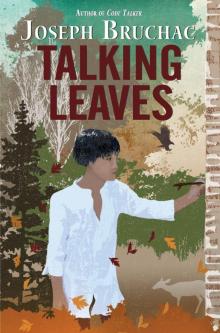 Talking Leaves
Talking Leaves Found
Found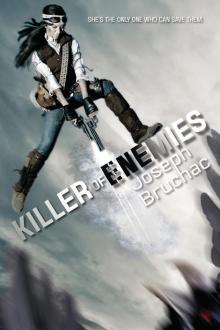 Killer of Enemies
Killer of Enemies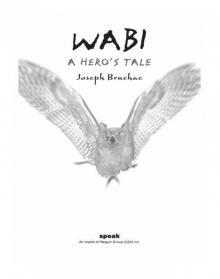 Wabi
Wabi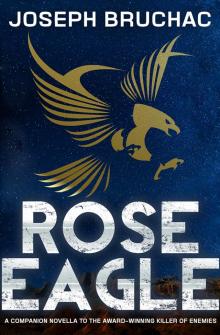 Rose Eagle
Rose Eagle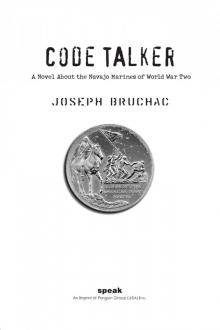 Code Talker
Code Talker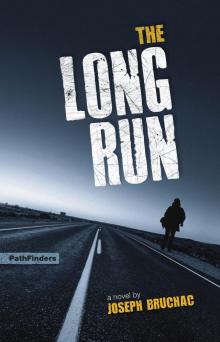 The Long Run
The Long Run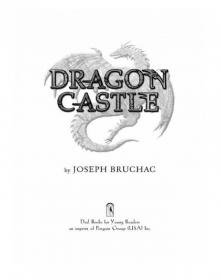 Dragon Castle
Dragon Castle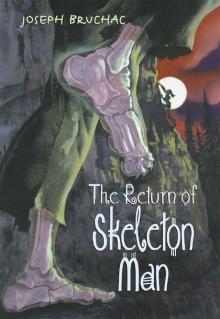 The Return of Skeleton Man
The Return of Skeleton Man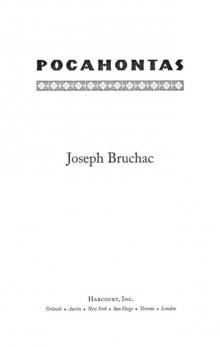 Pocahontas
Pocahontas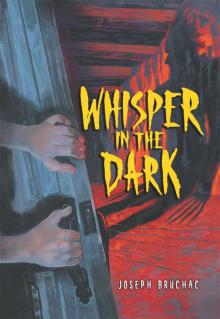 Whisper in the Dark
Whisper in the Dark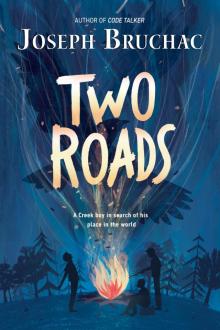 Two Roads
Two Roads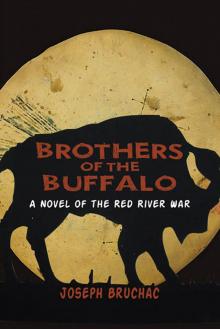 Brothers of the Buffalo
Brothers of the Buffalo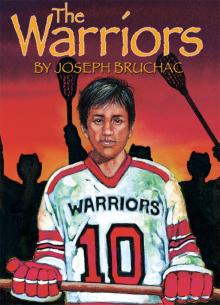 The Warriors
The Warriors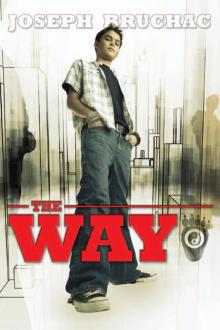 The Way
The Way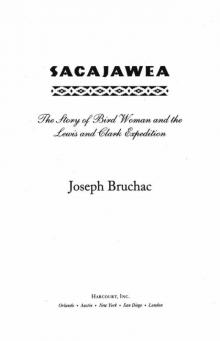 Sacajawea
Sacajawea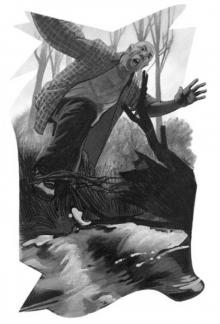 Night Wings
Night Wings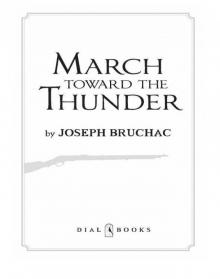 March Toward the Thunder
March Toward the Thunder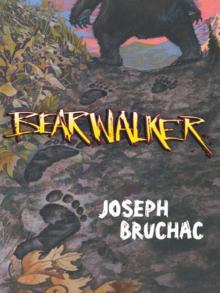 Bearwalker
Bearwalker Skeleton Man
Skeleton Man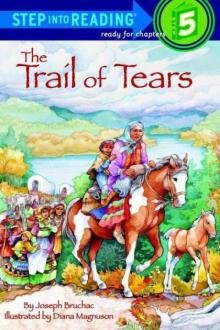 The Trail of Tears
The Trail of Tears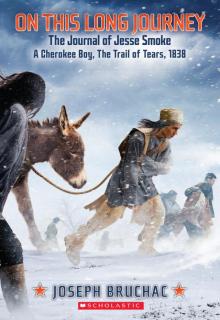 On This Long Journey
On This Long Journey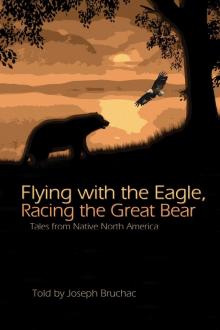 Flying with the Eagle, Racing the Great Bear
Flying with the Eagle, Racing the Great Bear